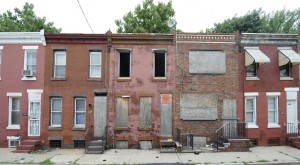Taxes Leave Philly Far Behind Other Cities In Collection
Posted on Dec 20 in Philly Newsby adminPrint

Article From: www.Philly.com
By: Patrick Kerkstra
Philadelphia runs the least-effective delinquent-property-tax collection system of the nation’s biggest cities, a system that has created a “culture of nonpayment” and cost the city and cash-strapped School District $472 million in unpaid real estate taxes, penalties, and interest.
It is a delinquency epidemic that reaches from Chestnut Hill to Point Breeze, infecting every neighborhood. In all, there are nearly 111,000 delinquent properties, or about 19 percent of all parcels in Philadelphia, according to an Inquirer and PlanPhilly.com analysis of city data.
The past-due properties include such pricey parcels as the proposed Foxwoods casino site, an Old City art gallery, a South Philadelphia hotel, and choice real estate a block off Rittenhouse Square.
But it is in low-income neighborhoods where the delinquency crisis has peaked and where the city’s response has been the least effective.
In communities such as North Philadelphia, Fairhill, and Tioga/Nicetown, the city has done little as tens of thousands of tax-delinquent properties – many of them abandoned lots and vacant shells – have rotted away, blighting neighborhoods and making redevelopment all that much harder.
In most U.S. cities, the vast majority of those properties would have long ago been seized for nonpayment and sold at sheriff’s auction.
Elsewhere, tax foreclosures are routine, even automatic. Property owners must pay what they owe or they can expect to lose their land, often within just a few years.
The process can be ruthless. But it serves two critical public needs: It collects money for essential services, and it cycles property out of the ownership of irresponsible parties.
In Philadelphia, that process works slowly when it works at all.
The city’s typical tax delinquent is 6.5 years behind and owes $4,249 in taxes, penalties, and interest.
Cumulatively, the delinquent properties are 720,000 years behind in taxes.
“That’s an astronomical level of delinquency. It is phenomenally high,” said Frank S. Alexander, a law professor at Emory University and a leading national authority on improving property-tax collection systems.
“Those numbers tell you there is a very high rate of nonenforcement. It means that the city has made a decision not to go after these properties.”
The Nutter administration agreed that enforcement was lax in the past, but the mayor insisted his administration had “been relentless in our pursuit of taxes owed to the city” and was diligently “making fixes to systems that have been broken for decades.”
It is certainly true that the massive backlog of uncollected property taxes predates Nutter’s first term by many years. Indeed, 26,000 properties are at least a decade behind, and the owners of nearly 8,500 properties haven’t paid a dime for 20 years or more.
But the Inquirer and PlanPhilly.com analysis of property-tax data between 2009 and 2011 found that the delinquency crisis has gotten worse under Nutter, even as the administration has talked tough about going after deadbeats.
In May 2009, there were just over 100,000 tax-delinquent properties in Philadelphia. Eleven months later, the number had grown to 104,000. A year after that, on April 30, 2011, the count had risen to nearly 111,000.
The total amount of taxes, penalties, and interest due to the city and schools grew as well, from $425 million in May 2009 to $472 million in April 2011, an 11 percent jump.
“It’s not surprising that during the worst economic downturn in generations, people would have a hard time paying their bills and delinquencies would increase,” Nutter said in a written response to questions.
The Inquirer and PlanPhilly.com review of the city’s tax-delinquency system further found that:
Philadelphia has more tax deadbeats per property than any other big city in the country.
Enforcement remains scattershot and ad hoc. The city pursues some deadbeats relentlessly, but many others get nothing more than a slap on the wrist.
Tax-delinquent empty shells and vacant lots are often left to languish on the delinquency rolls for decades, even when there is market demand for the land.
Philadelphia makes no organized effort to fight blight and target nuisance properties through tax foreclosures, squandering one of the most powerful redevelopment tools cities have.
The process is vulnerable to political influence, especially from City Council members.
City property records are poorly maintained and organized, making it harder to sell tax-delinquent properties cleanly at sheriff’s sales.
Despite the shortcomings in its collection system, the city insists it expects all property owners to pay.
“Our policy is that we expect everyone to either pay or make payment arrangements. The bottom line of our approach is that people should pay their taxes,” wrote Nutter, who declined to be interviewed for this article.
“It’s frankly unfair to others when they don’t, and, as a famous jurist once said, taxes are the price we pay in order to live in a civilized society.”
Officially delinquent Jan. 1
It isn’t supposed to work this way.
The city mails out annual property-tax bills in December. Payment is due by March 31.
Most property owners pay up promptly, often through their mortgage companies, which deduct from escrow funds to cover the tax.
For those who don’t pay, the property is officially considered delinquent – instead of merely past due – on Jan. 1 of the next year.
From there, it should take only about nine months to slap a lien on a property, get a court order to sell it at a sheriff’s sale, then auction it off, all while giving notice to the owner to pay up, or else.
In theory, properties are eligible for sale just 18 months after the first missed payment.
But in practice, few parcels are sold that quickly in Philadelphia.
In most cases, it takes many years before the city Law Department asks Common Pleas Court for what is called an “in rem” judgment against a property.
Even after the court issues a judgment against a tax-delinquent property, it takes an average of 2.4 more years before the land is finally sold at auction, an Inquirer and PlanPhilly.com analysis of a decade’s worth of Sheriff’s Office data found.
And that’s for the few long-term delinquent properties that make it to the auction block.
Tens of thousands of parcels are never subjected to any enforcement action beyond sternly worded letters from the city Revenue Department.
That permissiveness has allowed what City Controller Alan Butkovitz calls a “culture of nonpayment” to flourish.
“The city at some point got the idea, ‘Let’s have a heart, let’s give people a break,’ ” Butkovitz said, “and we’ve been doing that ever since.”
Over time, a high degree of nonpayment became normal – expected.
“It’s an untenable situation, but we haven’t treated it that way,” said State Rep. John Taylor (R., Phila.), a critic of the city’s handling of tax delinquencies. “We shrug and say, ‘It’s just the way it is. It’s just the way it’s always been.’ ”
That complacency has made Philadelphia one of the most tax-delinquent big cities in America.
A review of the 10 most-populous U.S. cities and five peer cities – Detroit, Baltimore, Cleveland, Boston, and Washington – found that Philadelphia had the most property-tax delinquents on a per-parcel basis.
New York City, for instance, has twice as many properties as Philadelphia, but fewer delinquencies overall: There are about 80,000 tax-delinquent parcels in New York City, compared with 111,000 in Philadelphia.
Boston, which has a tax-foreclosure system structurally similar to Philadelphia’s, had 5,000 delinquent accounts out of 145,000 properties citywide. That gives Boston a per-parcel delinquency rate of 3.4 percent, compared with Philadelphia’s 19.2 percent.
Philadelphia fares just as badly when compared with such distressed postindustrial communities as Wayne County, Mich., home to Detroit.
Wayne County has 23,000 delinquent properties – all of which will be sold at auction this year or taken over by the city, state, or county – out of a total of 836,000 parcels, for a 2.7 percent delinquency rate.
With 177,000 delinquent property accounts, Los Angeles County may be the only local tax-collecting entity in the United States with more than Philadelphia. But Los Angeles County has 9.8 million people, compared with Philadelphia’s 1.55 million. On a per-parcel basis, Los Angeles County’s delinquency rate is 5.4 percent, or less than a third of Philadelphia’s.
There is wide variation in the delinquency systems and laws used across the country, which means municipal governments are out there collecting taxes with different tools and different methods.
Some are arguably much more effective than those Philadelphia uses.
Washington, Phoenix, and Baltimore, for instance, have gotten out of the business of collecting taxes on delinquent real estate.
Each year, they sell the tax liens on their entire delinquent inventories to investors, effectively reducing their annual delinquency load to zero, and leave it to the investors to collect from past-due taxpayers and, if necessary, foreclose on properties.
Other cities, including New York, have systems that convey select pieces of tax-delinquent land to carefully selected developers, both for-profit and nonprofit, at a nominal cost to build low-income housing.
Detroit is one of a growing number of cities that put a large share of their tax-delinquent properties into a public land bank, which holds, maintains, and assembles tax-delinquent land before selling or giving it to developers.
Cleveland uses a mix of methods, selling some liens to investors, land-banking other properties, and auctioning off the rest.
There are advantages and drawbacks to each approach, but this much is clear: The cities that have developed a coherent strategy for managing tax-delinquent properties have far fewer of them than Philadelphia.
An ad hoc approach
In the absence of uniform enforcement, the city has developed an ad hoc approach to pursuing property-tax delinquents.
The city Law Department, which takes over collection efforts from the Revenue Department after nine months, has no written policy to guide which properties it will pursue and which it will let slide.
Some are outsourced to private collection agencies. Other accounts are kept in-house. Some properties are all but ignored for years or decades, while others are targeted vigorously.
“It’s a basic value that the obligation to pay property taxes should fall uniformly on all property owners, that the system ought not randomly pick those taxpayers who will be subject to enforcement or not,” said Daniel Kildee, who formed a trailblazing delinquent- land-management system in Flint, Mich., and who is now president and chief executive officer of the Center for Community Progress, a nonprofit that advises state and local governments how to cope with vacant land.
On some occasions, uniformity of enforcement is thwarted by direct political interference, as in the case of Martin Cabry, a senior aide to Councilwoman Jannie L. Blackwell who after 25 years of delinquency had racked up a debt of $100,000 to the city as of 2010. (The debt was later paid off when Cabry went into bankruptcy.)
Blackwell acknowledged that she routinely asks the city not to foreclose on delinquent properties in her district, including Cabry’s. Blackwell said she does not endorse nonpayment of taxes, but argued that the city should offer generous repayment terms to those who have fallen behind, and should waive penalties and interest.
“My political philosophy is that when everyone works together, everyone wins. So we put people in touch with the city to work it out,” Blackwell said. “We do it routinely.”
Blackwell has assigned a member of her staff to deal exclusively with her constituents’ real estate problems, from falling behind on taxes to mortgage trouble to landlord problems.
“This is kind of what I do. This is my thing. We do what we can to keep people indoors. And the city works with us.”
When Council interference is not a factor, city officials tend to target the biggest delinquent accounts first. That typically means higher-value real estate in more affluent parts of the city.
There is anecdotal evidence that suggests the city has recently gotten more aggressive with high-end delinquents.
Over the last year, for instance, the city has collected on, sold off, or won court approval for future sale of a number of big tax-delinquent accounts, including an abandoned brewery site in Strawberry Mansion ($348,000 past due), an empty warehouse at the North Philadelphia intersection of Broad and Lehigh ($237,000), a shuttered ironworks in Southwest Philadelphia ($533,000), and a row of Old City condos at Third and Walnut Streets ($39,000).
But other large debtors have gotten away with nonpayment for years without losing their land to sheriff’s sale.
According to city records, the largest delinquent, owing $6.1 million in principal, penalties, and interest on five unpaid years including 2011, is Roman Philadelphia Property L.L.C. at 1499 S. Columbus Blvd., site of the potential Foxwoods casino.
That debt is in dispute. Foxwoods, through its attorney, contended that the city has assessed the parcel at an exorbitant and inappropriate rate, given that it’s still empty land.
“We maintain those values should not be triggered until the Foxwoods casino is permitted to be developed and opened,” said F. Warren Jacoby of the law firm Cozen O’Connor.
Second on the list of delinquents – owing $1.6 million on 13 years of past-due taxes – is a long-bankrupt medical company once known as RHA Nursing, which still owns a large empty tract on Cobbs Creek Parkway at the western edge of Philadelphia.
Third, owing $1.29 million on four years of unpaid taxes on two parcels, is Walnut Rittenhouse Associates, a defunct consortium of overseas investors that bailed on a plan to build a condominium tower just off Rittenhouse Square.
William Martin, a lawyer representing Walnut Rittenhouse Associates, said the group had entered into a payment agreement with the city and began paying down its debt in June. (That payment has yet to be reflected in public records, however.) Martin said the full past-due amount would be paid off within 18 months.
There are plenty of other head-scratching cases, instances of valuable properties with sizable overdue-tax balances, including:
An office building and art gallery at 306 Cherry St. in Old City that is a decade past due and $108,000 in arrears. “They have every intention of paying their debt, and one way or the other, they will,” said Vern Anastasio, a real estate lawyer who represents the company that owns the building.
A boarded-up eyesore at 18th Street and Delancey Place, on one of Philadelphia’s most exclusive blocks. That property, which is three years behind, is $27,000 in arrears. The listed owner did not respond to phone calls or letters seeking comment.
The Skyview Plaza Hotel in South Philadelphia, which owes $859,000 in back taxes, penalties, and interest. The owners got into financial trouble for reasons ranging from the economy to unanticipated maintenance expenses, said lawyer John Calzaretto. “They’ve just had a very tough ride in Philadelphia,” he said of the owners. He added, “We’re hoping the city is reasonable” and will agree to cut some of the penalties and interest owed.
Citing privacy concerns, city officials declined to discuss these and other tax-delinquent accounts in any detail. In instances where the city had taken court action against a delinquent, Nutter administration officials pointed to the public record as evidence of their enforcement activity against tax delinquents.
In the case of Skyview Plaza, for instance, the city has been in litigation for years to get payment or sell the property at a sheriff’s sale, a process that has been thwarted by broken payment agreements and bankruptcy.
The city’s actions against landlord William Rowell are another example of how its enforcement system doesn’t always yield prompt payments.
According to city records, Rowell owns 133 properties in Philadelphia, mostly low-income rentals in the Southwest. As of April 30, 57 of those properties were delinquent, with a cumulative debt of $153,000.
Law Department officials say they pursue delinquents who own multiple properties, such as Rowell, particularly aggressively, even when the amounts owed on individual properties are relatively small.
The courts are littered with city lawsuits filed against Rowell for everything from alleged lead contamination to unpaid gas bills. City attorneys also cite 17 suits filed against Rowell in Municipal Court for nonpayment of property taxes in the last three years alone.
But the lawsuits in question – 10 of which were discontinued after Rowell made some payments – are not the “in rem” cases that give the city the right to sell off tax-delinquent property.
Rather, they are a low-cost, high-volume alternative, typically used to ensure that the city collects what it is owed when the delinquent property is sold or another party with a stake in the property, like a bank, forces a sale.
As a practical matter, that has meant Rowell’s properties are rarely, if ever, sent to the tax-auction block. In fact, there is no record of any of Rowell’s properties’ being sold for tax delinquency in the last decade, according to Sheriff’s Office data.
Rowell referred questions to his lawyer, Bob Willworth, who declined to comment.
Overwhelming debt
Lawyers and advocates for property owners who fall behind on their taxes say the city does their clients no favors by letting debt rack up for years on end. As interest and penalties accumulate, the total due on even a modest home can eventually become enormous.
“If the city went after people after two or three years, it would be much easier to collect,” said Philadelphia lawyer David Rubin, who specializes in tax-delinquency cases.
Rubin said his clients might miss a year’s payments because of job loss or illness.
“These are people who are choosing which of their bills to pay. When it’s the city’s bill, a lot of people tend not to pay, since there’s very little follow-up from the city,” he said. “They think they’re getting away with it.”
And many will, for an indefinite period.
But some, particularly owners of commercial or rental properties, won’t be as lucky. The city or one of its private collection agencies may eventually come calling, and by then, the debt is often so big the property owner can’t hope to pay it, Rubin said.
The exception is the owner-occupied home.
Auctioning off voters’ homes is the third rail of Philadelphia politics, the local equivalent of cutting Social Security.
Electoral concerns aside, there are a host of good reasons not to foreclose on owner-occupants: the possibility of increased homelessness and added strain on social services; the destabilization of neighborhoods already stressed by mortgage foreclosures; and, of course, the sheer emotional toll on families evicted from their homesteads.
Given all that, delinquency experts like Kildee and Alexander – both advocates of prompt foreclosures in most circumstances – think it is appropriate to give special consideration to owner-occupants, particularly low-income ones.
But they object to enforcement so permissive that it unofficially tolerates a kind of permanent delinquency without requiring delinquent taxpayers to enroll in a formal hardship program.
Of Philadelphia’s 111,000 tax-delinquent accounts, only 1,074, about 1 percent, have a hardship agreement with the city. The program lets low-income property owners stay in their homes, even as property assessments and tax bills rise, by permitting them to pay based on ability, as little as $25 a month in some cases.
“It’s not that you want to evict people from their homes. But why hasn’t there been more outreach to these low-income owner-occupants to get them to come in and work out a plan, get them into an agreement?” Alexander asked. “And if they’re not willing to come in and talk, then the city should go after the property.”
Talking a tough game
Since its earliest days, when it began to grapple with the budget crunch that has shaped so much of Nutter’s first term, his administration has talked up the need to improve collection of past-due taxes.
The administration has posted public lists of big delinquents, enlisted the boxer Bernard Hopkins to publicize a crackdown, and even dispatched Nutter to the doorsteps of some of the largest deadbeats, with TV cameras in tow.
In 2009, after an Inquirer report identified about 2,000 city employees who owed the city $5 million in property taxes, fees, and interest, Nutter and Butkovitz began withholding cash from the paychecks of delinquent public workers. About 60 percent of those employees are now tax-compliant, and most of the rest are on schedule to have their remaining debts paid off within five years.
The administration has also expanded a program begun by Mayor John F. Street that contracts out 66,000 of the past-due accounts to two private collection agencies. In 2010, the city collected $42 million in a tax-amnesty program that eliminated penalties and halved the interest due on tax-delinquent accounts.
But it turns out that despite Nutter’s tough talk, sheriff’s sales of tax-delinquent properties have been sharply scaled back since he took office. According to Sheriff’s Office records, only 128 tax-delinquent properties were auctioned last year, the lowest total in at least a decade and a 90 percent decline from 2004.
City Finance Director Rob Dubow attributed the decline to the amnesty – the city wanted to give people a chance to pay instead of losing their land – and to widespread problems in the Sheriff’s Office, which led to a moratorium on foreclosures between December 2010 and April. (A grand jury is now investigating the Sheriff’s Office’s real estate operations and accounting practices.)
Now that the moratorium has been lifted, the city intends to ramp up sheriff’s sales, with the goal of auctioning off about 600 properties a month. Not even owner-occupants will be immune.
“Historically, we rarely took owner-occupied homes to sheriff sale. We’ve changed that,” said Daniel W. Cantu-Hertzler, chairman of the city Law Department’s tax group. “We still prefer to keep people in their homes, but it has to be a real threat.”
The administration is also in the midst of overhauling its property-assessment system and its processes for managing vacant and publicly owned lands, all of which have important links to the issue of tax-delinquent real estate.
Nutter’s staff is also deeply involved in the continuing effort to modernize and clean up the independent Sheriff’s Office, where badly outdated technical systems have rendered record-keeping suspect and slowed the transfer of money to the city once tax-delinquent properties are sold.
These are big undertakings, and progress has been slow.
“We’re making fixes to systems that have been broken for decades, changing policies to ensure maximum collection efforts, and investing in people and technology in order to be more efficient and effective in our commitment to collect the taxes that are owed – by everyone,” Nutter wrote.
But the administration does not expect its reforms to yield a financial windfall for the city, at least not any time soon. The city’s five-year budget forecast anticipates no increase in collections of back-due property taxes between now and 2016.
Nonetheless, outside observers said there was reason to hope a second Nutter administration could show progress after a first term in which property-tax delinquencies only grew worse.
“I think they’ve admitted they have a lot of work to do, and they seem committed to doing it,” said Taylor, the state representative, who is pushing land-bank legislation in Harrisburg intended to improve management of vacant land. “I think this administration recognizes the enormity of the problem.”




































































